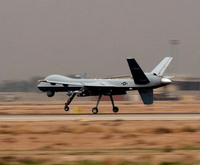Last November, in the restive tribal region on Pakistan's border with Afghanistan, an American Predator drone circled several thousand feet above the village of Ali Khel. Firing one of its Hellfire missiles, the drone destroyed a compound that was reportedly occupied by two senior al-Qaida officials: Abu Zubair Al Masri, an explosives expert from Egypt, and Rashid Rauf, a Pakistani linked to a 2006 plot to bomb London Heathrow airport. Both Al Masri and Rauf died in the blast, according to intelligence officials quoted by press reports.
The attack was just one of scores of air strikes conducted by robotic aircraft -- operated by the CIA and U.S. military, and based in Pakistan -- in a campaign to "decapitate" extremist groups that began as early as 2005. By early 2008, the strikes had already killed around 50 al-Qaida operatives, according to the New York Times, with the rate of attacks increasing significantly in that year. Dozens of civilian casualties have been reported.
Unmanned aircraft are a favorite tool for covert U.S. attacks due to their long range, quiet engines and sophisticated sensors.

